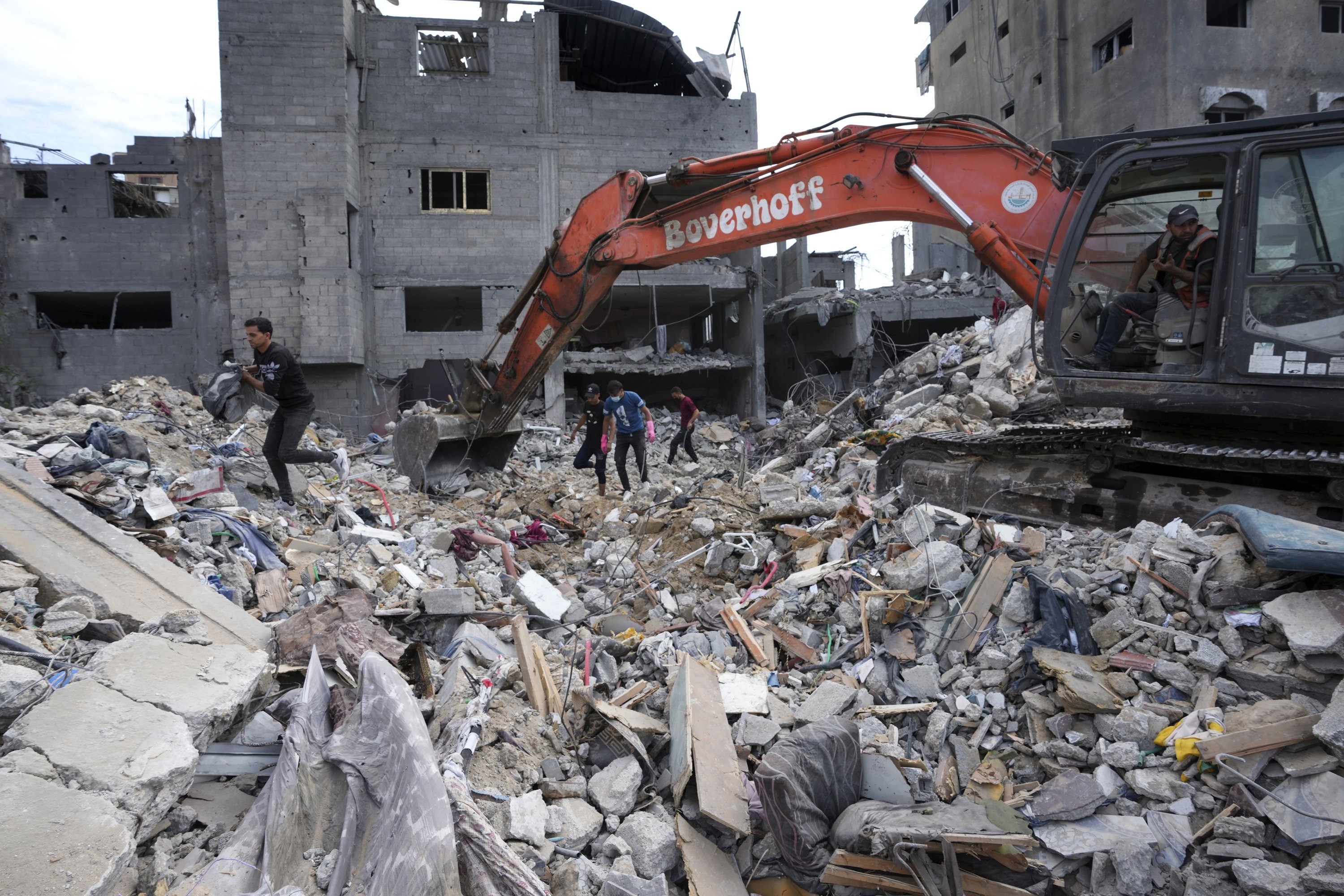© Turkuvaz Haberleşme ve Yayıncılık 2024
Block after block, the devastating wreckage stretches endlessly, accompanied by a sickening smell, as hundreds of people daily claw through tons of rubble using shovels, iron bars and their bare hands.
They search for the bodies of their children, parents and neighbors – all victims of Israeli missile strikes, their lifeless forms lying somewhere amid the endless acres of destruction.
After over five weeks of Israel's conflict with Hamas, certain streets now resemble graveyards, with officials in Gaza stating their lack of equipment, human resources, or fuel to conduct thorough searches for the living, let alone the dead.
Hamas, the group responsible for the Oct. 7 incursion that claimed approximately 1,200 lives in Israel, has allegedly established many of its bases within Gaza's densely populated neighborhoods.
In retaliation, Israel is aiming at these strongholds, yet the casualties often include ordinary Palestinians, many of whom remain undiscovered.
Omar al-Darawi and his neighbors have dedicated weeks to combing through the remnants of a pair of four-story houses in central Gaza, where 45 people resided and 32 lost their lives.
In the initial days following the attack, 27 bodies were successfully recovered, but five of the ones still missing were al-Darawi’s cousins.

The victims include Amani, a 37-year-old stay-at-home mom who died with her husband and their four children; Aliaa, 28, who was taking care of her aging parents; and another Amani who perished with her 14-year-old daughter, while her husband and their five sons survived.
"The condition deteriorates with each passing day," lamented the 23-year-old al-Darawi, formerly a college journalism student, emphasizing the increasingly unbearable smell.
"We can’t stop,” he said. "We just want to find and bury them” before their bodies are lost in the rubble forever.
According to the Health Ministry in Hamas-run Gaza, the attacks have resulted in the deaths of over 11,200 people, with two-thirds being women and children.
The U.N. humanitarian affairs office estimates that approximately 2,700 individuals, including 1,500 children, are missing and believed to be buried in the rubble.
The absence of the missing has deepened the anguish of families in Gaza, predominantly Muslim.
Islamic tradition emphasizes swift burials – ideally within 24 hours – with the shrouded bodies facing the holy city of Mecca.
Typically, family members cleanse the body with soap and scented water, accompanied by prayers for forgiveness at the gravesite.
The search is particularly difficult in northern Gaza, including Gaza City, where Israeli ground forces are battling Hamas members.
Hundreds of thousands of people have fled southward, terrified by the combat and pushed by Israeli warnings to evacuate.
But even in the south, continued Israeli airstrikes and shelling mean nowhere is safe in the tiny territory.
The Palestinian Civil Defense Department, Gaza’s primary search-and-rescue force, has had over two dozen workers killed and over 100 injured since the war began, said Mahmoud Bassal, the department spokesperson.
More than half of its vehicles are now either without fuel or have been damaged by strikes, he said.
In central Gaza, outside the northern combat zone, the area's civil defense director has no working heavy equipment at all, including bulldozers and cranes.
"We actually don’t have fuel to keep the sole bulldozer we have operating," said Rami Ali al-Aidei.
At least five large bulldozers are needed just to search a series of collapsed high-rise buildings in the coastal town of Deir al-Balah, he said.
This means that bodies and the desperate people searching for them are not the focus.
"We’re prioritizing areas where we think we will find survivors,” said Bassal.
As a result, the search for bodies often falls to relatives or to volunteers like Bilal Abu Sama, a former freelance journalist.
He ticks off a handful of Deir al-Balah’s victims: 10 corpses are still lost in what is left of the al-Salam Mosque; two dozen bodies are missing in a destroyed home; and 10 are missing in another mosque attack.
"Will those bodies remain under the rubble until the war ends? OK, when will the war end?” said Abu Sama, 30, describing how families dig through the wreckage with no tools. "The bodies will be decomposed. Many of them have already decomposed.”
On Tuesday, 28 days after an airstrike flattened his cousin's home, Izzel-Din al-Moghari found his body.
In the Bureij refugee camp, the home housed 24 members of his extended family, with all but three tragically losing their lives, while eight remain missing.
Three days after the strike, a civil defense bulldozer arrived to clear the road but swiftly departed for another collapsed building. On Tuesday, the bulldozer returned and assisted in locating al-Moghari's cousin.

After finding his cousin, al-Moghari went back into the wreckage in search of his father and other relatives.
"I am stunned,” he said. "What we lived through is indescribable.”
Gaza has become a place where many families are denied even the comfort of a funeral.
Al-Darawi, the man searching for his cousins, understands that.
"Those who found their dead are lucky," he said.
